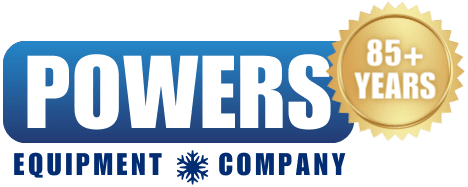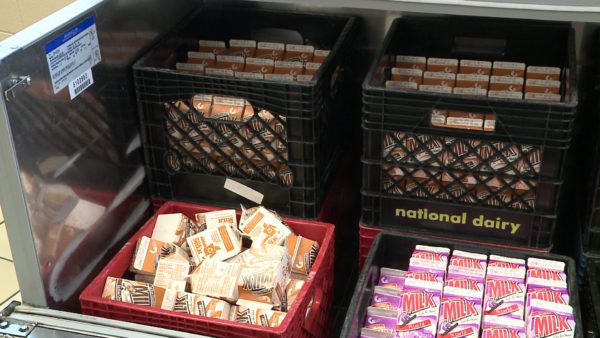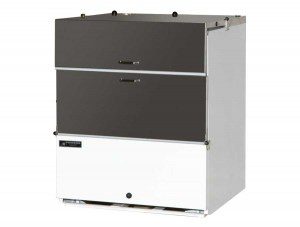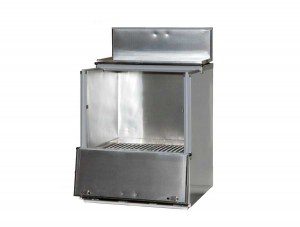Milk is a delicious, time-tested healthy drink option that kids and adults love. Every school cafeteria needs a high quality, dependable and low maintenance way to serve and store this in-demand beverage. This blog will discuss some of the critical features of school milk coolers and how a Powers Equipment commercial milk cooler is an excellent choice for your school, daycare, or business.
In this Milk Cooler Guide:
- Milk Cooler Types
- How Do Commercial Milk Coolers Keep Milk Cold?
- How to Choose a Milk Cooler
- Milk Cooler and Dispenser Benefits
- Popular Milk Cooler Vendors
- Related Reading
Types of School Milk Coolers Available
Finding the right school milk cooler is an important choice because it impacts the safety of the milk, the ability of the user to see and reach the milk, and how easy it is for your staff to load and maintain the unit. To make that choice you must know the milk capacity needed for children and staff. School milk coolers vary in capacity, access (top vs. side or both), and refrigeration system, among other things. Read on to explore these features and see what is a better choice for your school cafeteria or business.
How Do Commercial Milk Coolers Keep Milk Cold?
School milk coolers are generally cooled either by forced-air refrigeration or a cold wall evaporator. Forced-air refrigeration employs the use of a fan or fans to circulate air over an evaporator coil which in turn cools the air and the contents of the cooler. Cold wall technology, on the other hand, relies on refrigerant which is run through tubes within the walls of the unit to keep contents cool. Cold wall technology is not only quieter but also uses space more efficiently because no room is needed for a separate fan or fans. This makes cold wall technology a better choice for tightly packed items like milk. Powers Equipment has been using cold wall technology in commercial milk coolers for decades.
How to Choose a Commercial Milk Cooler for Your School Cafeteria
With the increased push for better nutrition in schools, milk continues to be the leading choice as the go-to alternative to fruit juices and other drinks that can be high in sugars, School cafeterias are not only tasked with providing nutritious and healthful food but also ensuring that it is safe for consumption while being easily accessible for students. The following are some of the primary considerations in how to choose a commercial milk cooler that fits your needs.
Determine the Size and Capacity of Your Commercial Milk Refrigerator
The size and capacity of your commercial milk Refrigerator are important considerations that are based on location and accessibility. You must first determine who will be using the cooler. It does make a difference as to the age of the students for a number of reasons.
While it may be acceptable for younger children (elementary school) as well as older children (high school and college) to have open access to the product in a commercial milk cooler, there may be precautionary restrictions when they are very young (second or third grade as opposed to being in grades six through twelve and beyond.
Location becomes a determining factor in either instance as it must fit into an ideal location for access by students as well as cafeteria employees. This leads to the consideration of capacity. The size of the student body is the next consideration. The total student population is not the sole determinant as the average daily consumption is a better determinant.
Many schools have more than one lunch period due to student body size or age classifications. Consequently, restocking from the kitchen walk-in cooler or second milk cooler becomes a consideration that affects capacity.
A commercial milk refrigerator often is the point of sale for more than cartons of milk, which can also vary in size. Consequently, other dairy items or small items that need to remain cold but not frozen may be part of the equation such as yogurt, smoothies, etc. Locks may be a consideration as well depending on the placement of the cooler.
Consider a Commercial Milk Cooler’s Construction, and Cooling Efficiency
Construction of the commercial milk cooler is also a primary consideration for a variety of reasons. While a stainless steel exterior may be the most desirable, a powder-coated exterior may be more aesthetically pleasing to ensure that the unit fits into a non-institutional design motif. The heart of the unit is its condensing unit, which keeps the contents at the proper temperature. For milk and other dairy products, the ideal temperature is between 35°F and 45°F. In order to maintain this temperature, the size, capacity, and usage patterns of the unit are important considerations.
While superior commercial milk coolers are highly accessible when in use as well as equipped with hinged lids that allow them to be closed (and potentially locked) when not in immediate use, changing capacity over the course of hours of concentrated access as well as the normal fluctuations in stock can make it difficult for the condenser to maintain a constant temperature. Consequently, the unit must have a condenser that the manufacturer can verify meets the needs of the stated capacity. Ideally, it should be self-adjusting to accommodate that constant temperature in the face of fluctuating use and capacity while also providing an easy means to monitor the temperature at a glance.
Milk Coolers Designed for Easy Cleaning Access
Just as maintaining the right temperature is an important safety consideration, so too is the cleaning and maintenance aspects of the milk cooler. The design and construction of the commercial milk cooler must be such that the seals, hinges, doors, and shelves as well as the mechanical areas not only provide a proper seal and durability, they must be easily accessible for the constant cleaning that must be part of any protocol. Removable plastic bottoms for pans and an easily removable vinyl gasket are necessities for cleaning as well.
The fan for the condenser keeps the air circulating to maintain the temperature, so dust vents must be adequately designed to allow a free flow of air into the unit as well as being easily accessible for cleaning. Drain lines that take away the water from the condenser cooling process, as well as the pans that catch the water, must be designed for easy cleaning access and durability to ensure that it is easy to avoid spills, stains, dirt buildup, and odors.
What are the Capacities Available for Powers School Milk Coolers?
Powers Equipment school milk coolers have several capacities available. High-quality features and construction make it easy to serve and store milk and stand the test of time. The three capacities/ models available for Powers Equipment school milk coolers are as follows:
- 8 case capacity Model 681
- 12 case capacity Model 569
- 16 case capacity Model 780
What are the Features of Powers Commercial Milk Coolers?
Powers Equipment Company supplies commercial milk refrigerators that will be in it for the long haul. Each cooler is energy efficient and quiet while running completely with all copper tubing. Its easy-to-remove trays make it simple to clean so things stay safe and sanitary. You can also purchase an optional lock for security if necessary.
- All Powers Equipment school milk coolers have a heavy-gauge, aluminum interiors, and cold wall technology with all copper tubing and a 1/5 HP condensing unit which uses environmentally friendly R-290 refrigerant.
- Powers Equipment units have a unique lid system that delivers the lowest serving height – only 16 inches – in the industry, which makes them ideal for serving children.
- Powers Equipment units also have an optional lock, easy to remove and clean plastic bottoms and powder-coat or stainless-steel exteriors.
How to Maintain School Milk Coolers
- Check Temperature: Monitor the temperature of your school milk cooler daily. Milk should be kept at a temperature of 40 degrees Fahrenheit for optimal freshness.
- Clean Surfaces: Wipe down the interior and exterior of your school milk cooler daily to reduce odors and growth of bacteria. Weekly, do more intensive cleaning with appropriate bleach-free or ammonia-free products.
- Maintain per Schedule: Follow the regular maintenance schedule for the school milk cooler to flush drain lines and remove dust from filter vents. Replace brittle gaskets as necessary.
- Repair Unit: As needed, repair damage to the unit from rust, leaks, and normal use. Fix latches, trays, and hinges on the school milk cooler.
- Position Properly: Good airflow is important for the optimal functioning of the unit. Make sure the school milk cooler is located in an area with good airflow and that nothing is leaning against it.
The Importance of a Quality Commercial Milk Cooler
Unlike a standard fridge, a commercial milk refrigerator allows you to serve directly from the case or use it as a convenient storage solution in a back room. It is also capable of keeping milk colder than a typical refrigerator, meaning it will last longer and reach its recipient in a more refreshing state.
Many companies manufacture commercial milk coolers, but only some supply such a product that’s truly built to last.
When purchasing a commercial milk cooler, look for one that not only fits well with your storage options but also will stand the test of time. Serving milk at inappropriate temperatures can lead to illness, which is the last thing any food-service business wants to have happened at their location.
When you’re looking for a refrigeration system that will keep beverages at a safe and sanitary temperature, a milk cooler is incredibly helpful.
Fresh, cold milk is the cornerstone of healthy eating in school cafeterias around the country. School milk coolers not only keep milk fresh and safe for drinking but also offer low maintenance and attractive way to serve and store milk. Call Powers Equipment Company today to order your high-quality school milk cooler in the size and specifications that meet your needs.
Last but not least, the manufacturer must be committed to acting as a partner in the decision-making process so as to help make the best determination on a commercial milk cooler that fits your specific needs. To see the wide selection and find out more about the milk coolers manufactured and sold by Powers Equipment.
References:
- https://www.katom.com/learning-center/school-milk-cooler-buyers-guide.html#
- https://www.katom.com/cat/school-milk-coolers.html
- https://www.powersequipment.com/p/commercial-milk-refrigerator/
- https://www.powersequipment.com/blog/school-cooler-use-and-maintenance/




